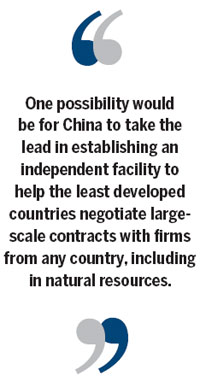Challenges for Chinese investment
Updated: 2013-11-01 10:07
By Karl Sauvant (China Daily Europe)
|
|||||||||||
Country has opportunity to participate actively in creating multilateral framework
Since China adopted its "going out" policy in 2001, its outward foreign direct investment flows have grown rapidly, reaching $84 billion (61 billion euros) last year, (although the stock remains small). That year, China was the world's third-largest outward investor, after the United States and Japan.
This performance raises all sorts of issues, especially because state-owned enterprises control some three-quarters of the country's OFDI stock.
A short-term challenge for China's government is to consider what to do regarding the growing skepticism in some host countries about the country's OFDI. It is motivated partly by the usual difficulty of accommodating new competitors, concerns about national security and concerns about the impact of Chinese OFDI projects, even though this impact may not be that different from that of companies from other countries.
Addressing these concerns requires China to formulate and enforce a "going in" strategy to complement its "going out" policy. Part of this strategy requires paying considerably more attention to the promotion of sustainable FDI, that contributes as much as possible to the economic, social and environmental development of host countries, and takes place in the context of fair governance, including contracts in natural resources FDI.
One possibility would be for China to take the lead in establishing an independent facility to help the least developed countries negotiate large-scale contracts with firms from any country, including in natural resources.
A medium-term challenge is to see how China responds to the efforts by some developed countries - for example, in the context of the Trans-Pacific Partnership negotiations - the support such as financial and fiscal incentives that governments give to their state-owned enterprises investing abroad. This issue is particularly important for China, given its elaborate set of measures that support Chinese firms going abroad.

However, China is not alone in rendering such support. Most developed countries and a few emerging markets do the same, including for companies in the private sector.
One way to deal with this challenge is to extend the discussions and negotiations of this subject to all measures available to companies investing abroad, regardless of whether they are government-owned, in the interest of full competitive neutrality. However, since home country measures in some sense mirror incentives to attract FDI, and efforts in the past to discipline the latter have come to naught, disciplining OFDI incentives will be a challenging endeavor.
Finally, a long-term challenge is for China to determine what role it wants to play in constructing a multilateral framework for investment. The direct investments of Chinese enterprises often face resistance in the host country, which may well intensify as China's OFDI grows, so it is in China's interest to put in place multilateral rules that embody a proper balance between protecting FDI and leaving sufficient policy space for governments to pursue legitimate public policy objectives.
With China's rise as an investor, its interests as a host country to protect its policy space have increasingly been complemented by its interests in protecting the investments of its companies abroad, reflected in the evolution of its international investment agreements.
In fact, if one wanted to pinpoint the precise date at which China's home country interests became equal to, or more important than, its host country interests, one might point to July 11 this year, when China agreed, in the context of the US-China Strategic and Economic Dialogue, to continue negotiations on an investment treaty with the US on the basis of pre-establishment national treatment and the negative list approach to exceptions to such treatment. This conceptual and policy breakthrough could lay the foundations not only for an agreement between the two countries, but also for a broader investment framework.
China did not participate in the creation of the world's financial and trade frameworks. If and when this issue reaches the international agenda again, it has the opportunity to participate actively in the process of creating a multilateral investment framework, perhaps even taking the lead in this process.
The author is resident senior fellow at the Vale Columbia Center on Sustainable International Investment, a joint center between Columbia Law School and the Earth Institute at Columbia University. The views do not necessarily reflect those of China Daily.
(China Daily European Weekly 11/01/2013 page12)
Today's Top News
Premier Li seeks point of balance
Reform roadmap before key meeting
Intel leaks proved justified: Snowden
Cooperation needed in terror fight
Beijing to further boost visa-free stay
Shenzhou X crew awarded for outstanding service
US to file murder complaint against LAX shooter
China's non-manufacturing PMI rises in October
Hot Topics
Lunar probe , China growth forecasts, Emission rules get tougher, China seen through 'colored lens', International board,
Editor's Picks

|

|

|

|

|

|





